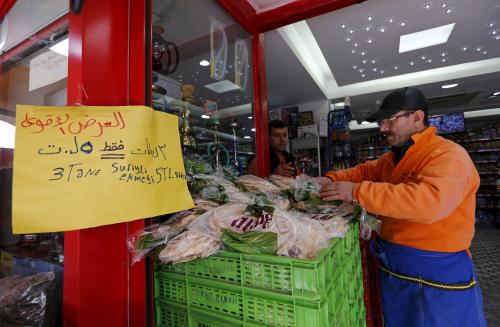Turkey’s Syrian businesses, which are key to better integrating the largest number of Syrian refugees anywhere—3.6 million—face a trifecta of challenges. Turkey’s 2018 economic crisis has been exacerbated by the COVID-19 closures and weakening earnings as unemployment and inflation surged. Furthermore, Turkish public opinion, though distracted, shows no sign of softening anti-migrant views.
Widespread anti-immigrant narratives fed by politicians and social media trolls create challenges for those supporting refugees including NGOs, researchers, and charities. Lies that have been propagated include supposed government stipends, pathways to easy citizenship and voting rights, readily available work permits, entry into universities of their choosing, tax breaks, and other falsehoods. Bouts of violence had erupted, often targeting Syrian firms. While these remain the exception they are terrifying to a vulnerable population (nearly half were below the poverty line even before the crisis), who are sometimes prey to arbitrary deportations.
In 2016, 72 percent of Turkish citizens had no problems with Syrian refugees. By 2018, however, as the economy stalled, a majority wanted them repatriated—82 percent in a 2019 poll by the firm PIAR. The 2019 Syrian Barometer survey and a 2020 survey by Bilgi University and the German Marshall Fund both showed 86 percent supporting repatriation. Aside from the ruling party AKP’s leadership, which still defends the refugee policy, Turkey’s sharply polarized electorate coalesces around anti-migrant views—contributing to the 2019 opposition victories in municipal elections in large cities, including Istanbul.
The Syrian Barometer survey, however, contrasts sharply with Turkish responses. Over 90 percent of Syrians do not want to return now and over half never want to go back. In 2019, 30 percent said they would return if the war ended and an acceptable government was established. In 2017, it had been 60 percent. While Turks see sharp cultural and social differences, Syrians do not. Nearly a decade on, though, major conflagrations have been avoided. Professor Murat Erdogan, who led the survey, says that while Turks complain when asked, they do not reflect their “anxieties onto the Syrians,” saying refugees are also shielded by their largely inward-looking lives and neighborhoods.
One venue for fuller integration is Syrian businesses. In July 2020, there were reportedly 9,041 firms with Syrian owners and, in 2019, the ministry of trade listed 15,159 firms with at least one Syrian partner. Syrian firms employ an average of seven people of whom 60 percent are Syrians. Some 250,000 workers and their dependents, 7 percent of Syrian refugees, rely on them. But numbers for Syrian firms are faltering (Table 1). By 2020 only 377 new Syrian firms were established, a decrease of around 50 percent from the previous year.
Table 1. The number of new Syrian firms is declining
| Year | All new firms | All new foreign firms | Syrian firms |
| 2011 | 53,477 | 3575 | 107 |
| 2012 | 39,764 | 3703 | 167 |
| 2013 | 58,987 | 3875 | 489 |
| 2014 | 67,920 | 4736 | 1257 |
| 2015 | 67,622 | 4729 | 1599 |
| 2016 | 63,709 | 4523 | 1764 |
| 2017 | 73,708 | 6731 | 1202 |
| 2018 | 86,349 | 13,405 | 1595 |
| 2019 | 85,263 | 12,634 | 747 |
| 2020 | 102,794 | 10,362 | 377 |
Source: Turkiye Odalar ve Borsalar Birligi (Turkey Union of Chambers and Commodity Exchanges of Turkey) – Bilgi Erişim Müdürlüğü (tobb.org.tr)
Note: These are composed of joint stock companies plus a majority as limited liability companies.
Not all is due to growing public opposition, but its impact is inescapable. Refugees with the skills and capital to establish firms were quick to do so. But as the political climate worsened and the economic crisis hit, the less experienced with less capital found it harder to establish new firms, giving up or eyeing informal businesses. The more experienced grew warier as well. Regulations were also tightened, firms must now show active business operations and cannot be established pro-forma to acquire property or citizenship.
Even as the UNDP lauds Turkey as best practice in its handling of refugees, it also underlines that existing Syrian businesses are faring worse than Turkish firms. According to the Business for Goals Platform, a Turkish public-private partnership with the UNDP, in May 2020, nearly 40 percent of Syrian firms reported a freeze in operations versus 30 percent of Turkish firms. Some 54 percent of Syrian firms saw their turnover fall by over 50 percent versus 34 percent of Turkish firms. Worryingly, some 80 percent of Syrian firms were unprepared for a second wave of the pandemic versus 50 percent of Turkish firms.
However, there are measures that can be taken to support existing firms and incentivize new ones. Some are simple like making laws and regulations readily available in Arabic, easing compliance, and accessing crisis assistance. Access to finance is the main challenge cited by Syrian entrepreneurs and needs concerted attention and resources. More politically problematic are easing limits on how many Syrians versus Turks can be employed by one firm and moving beyond the refugees’ temporarily protected status, to a more secure residency. TEPAV also stresses local leadership, pointing to Gaziantep city and municipal and local chambers of commerce provided to Syrian firms. Building Markets, an American NGO, underlines opportunities in expanded partnerships between Syrian and Turkish firms.
Majorities on both sides now recognize the refugees’ permanence, even if grudgingly on one side. However, better policies for integration are critical to avoid an underclass with a minority potentially prone to criminality and extremism. As the economy rebounds and with appropriate measures, a hopeful scenario would see tensions ease as unemployment drops and businesses grow.
Longer term, with over 1 million Syrians working, mostly informally, but free of official harassment and thousands of businesses set up, the Syrians could over time assimilate into Turkey’s sprawling and diverse cities. Almost all kids, most in schools, now speak Turkish as do increasing numbers of adults. They could emulate millions of Anatolians—Turks, Kurds, and others—who moved into urban centers over past decades, lived in their own neighborhoods, but are now part and parcel of the landscape. The alternative would be a tragedy for both hosts and refugees.
The Brookings Institution is committed to quality, independence, and impact.
We are supported by a diverse array of funders. In line with our values and policies, each Brookings publication represents the sole views of its author(s).








Commentary
Challenges facing Turkey’s Syrian businesses
March 19, 2021